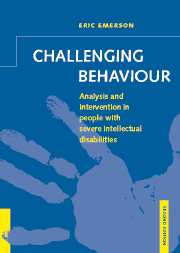4 - Models and theories
Published online by Cambridge University Press: 14 August 2009
Summary
The previous chapters have concentrated on defining the social significance of challenging behaviour on the basis of its prevalence, persistence and the impact such behaviours may have on the person themselves and those who support them. Attention was also drawn to some of the personal and environmental ‘risk factors’ which are associated with variation in the prevalence and, to a lesser extent, persistence of challenging behaviour. In this chapter, we will turn our attention to trying to understand why a substantial minority of people with severe intellectual disability show challenging behaviour.
Behavioural and neurobiological/psychiatric traditions have dominated applied research within the field of intellectual disabilities. These approaches have generated voluminous amounts of basic and applied research and have lead directly to the development of approaches to intervention, many of which have been empirically validated. This is not to say that other approaches – other ‘ways of knowing’ – have no contribution to make to furthering our understanding of challenging behaviour (see, for example, Meyer & Evans, 1993b; and commentaries by Baer, 1993; Evans & Meyer, 1993; Ferguson & Ferguson, 1993; Kaiser, 1993; Morris, 1993). Rather, it would appear that research within alternative paradigms has either been largely unproductive (e.g. psychoanalytic interpretations of challenging behaviour: see Carr, 1977) or is still in its relative infancy.
As a result, this chapter will first summarize the results of research undertaken within these two traditions before exploring possible interconnections between them.
Information
- Type
- Chapter
- Information
- Challenging BehaviourAnalysis and Intervention in People with Severe Intellectual Disabilities, pp. 31 - 65Publisher: Cambridge University PressPrint publication year: 2001
